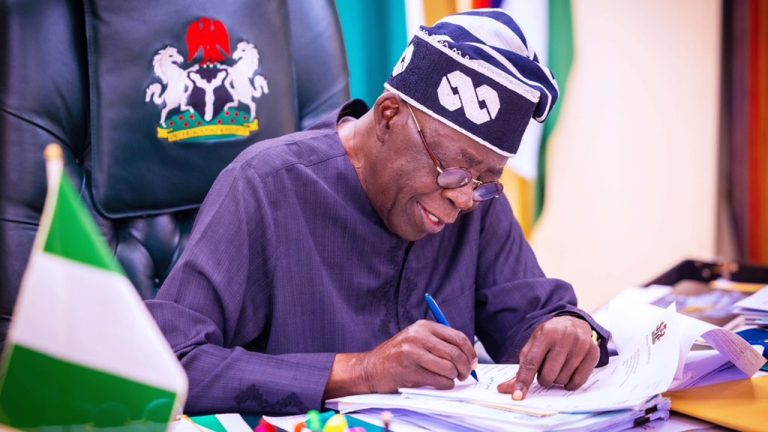By Chukwuma Umeorah
President Bola Tinubu has signed the Investments and Securities Bill (ISB) 2025 into law, replacing the Investments and Securities Act No. 29 of 2007. The enactment of the new law, now known as the Investments and Securities Act (ISA) 2025, aims to strengthen Nigeria’s capital market framework, enhance investor protection, and introduce reforms to improve market integrity, transparency, and sustainable growth.
The Securities and Exchange Commission (SEC) announced this in a circular released by its Head, External Relations Department, Efe Ebelo, on Saturday. The ISA 2025 reaffirms the Commission’s commitment as the apex regulator of the Nigerian capital market, ensuring capital formation, investor protection, and a fair, efficient, and transparent market. It also introduces transformative provisions aligning Nigeria’s market operations with global best practices.
Speaking on the key highlights of the Act, Director General of the SEC, Emomotimi Agama, stated, “The Act enhances the regulatory powers of the SEC in a manner comparable with benchmark global securities regulators. These enhanced powers and functions ensure full conformity with the requirements of the International Organization of Securities Commissions (IOSCO’s) Enhanced Multilateral Memorandum of Understanding (EMMoU), enabling the SEC to retain its ‘Signatory A’ status and enhancing the overall attractiveness of the Nigerian capital market.”
The ISA 2025 classifies securities exchanges into Composite and Non-composite Exchanges, with Composite Exchanges facilitating the listing and trading of all categories of securities, while Non-composite Exchanges focus on specific security types. Additionally, new provisions cover Financial Market Infrastructures, including Central Counterparties, Clearing Houses, and Trade Depositories. The Act further expands the definition of securities to explicitly recognize virtual/digital assets and investment contracts, bringing Virtual Asset Service Providers (VASPs), Digital Asset Operators (DAOPs), and Digital Asset Exchanges under SEC’s regulatory purview.
Agama highlighted key regulatory provisions, stating, “The Act introduces comprehensive insolvency provisions for Financial Market Infrastructures, exempting transactions facilitated through or otherwise involving these infrastructures from the application of general insolvency laws. It also introduces measures for monitoring, managing, and mitigating systemic risk in the Nigerian capital market.”
Further provisions in the ISA 2025 expand the categories of entities eligible to issue securities to the public, facilitating innovative financial products and investment opportunities subject to SEC’s approval. The Act also establishes a regulatory framework for Commodities Exchanges and Warehouse Receipts, supporting the development of Nigeria’s commodities market ecosystem. The law mandates the use of Legal Entity Identifiers (LEIs) in capital market transactions for transparency and explicitly prohibits Ponzi schemes and other unlawful investment activities, prescribing stringent penalties for violators. It also strengthens the Investments and Securities Tribunal by amending provisions on its composition, the appointment of the Chief Registrar, and the Tribunal’s jurisdiction to improve its effectiveness.
Agama described the President’s assent as a transformative step for the Nigerian capital market, stating, “By addressing regulatory gaps and introducing forward-looking provisions, the new Act empowers the SEC to foster innovation, protect investors more efficiently, and reposition Nigeria as a competitive destination for local and foreign investments. We commend all stakeholders within and outside the capital market community for their unwavering solidarity towards the achievement of this historic milestone and solicit their continued collaboration in respect of the effective implementation of the ISA 2025 for the benefit of our economy.”
The Commission extended its appreciation to the National Assembly for its dedication in enacting the new legal framework, recognizing their extensive stakeholder engagements and bipartisan support. “We also commend the Honourable Minister of Finance and Coordinating Minister of the Economy of Nigeria as well as the Minister of State for Finance for their invaluable contributions to the realisation of this groundbreaking project. Their strategic guidance, policy expertise, and steadfast support have ensured that the ISA 2025 aligns with Nigeria’s broader economic objectives.”
The SEC pledged it would continue to engage with market operators, investors, and all stakeholders to ensure a seamless transition from the repealed ISA 2007 to the new legal regime established under the ISA 2024.
